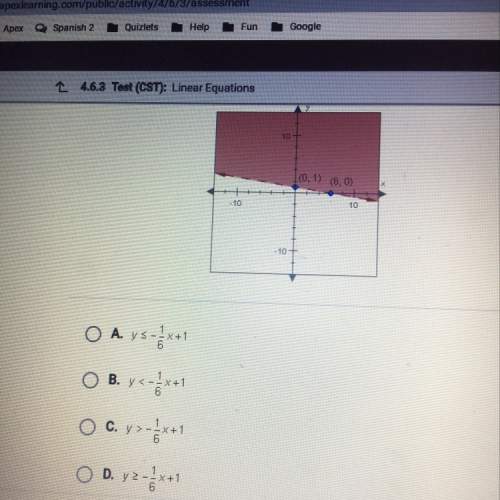
Mathematics, 12.03.2020 02:42 daniella0123
Here we work in the system of integer polynomials. Those are polynomials of the Form f(x)=rnxn+···+r1x+r0 where every coefficient is an integer. General question: When does some combination of the polynomials ax + b and cx + d equal 1 ? That is, when do there exist integer polynomials P(x) and Q(x) with P(x)·(ax + b) + Q(x)·(cx + d) = 1 ? We concentrate here on cases when c = 0. (a) Prove: No combination of 2x + 5 and 3 can equal 1. That is, no integer polynomials P (x), Q(x) can satisfy: P (x)·2x + 5 + Q(x)·3 = 1. (b) Find a combination of 2x + 5 and 4 that equals 1. (c) Does some combination of 15x+9 and 25 equal 1? How about 15x+9 and 20? Explain your reasoning. (d) Investigate further examples of ax + b and d, deciding in each case whether 1 is a combination. What patterns do you detect? Can you prove that some of your observed patterns always hold true?

Answers: 1
Another question on Mathematics

Mathematics, 21.06.2019 13:00
Mary had at least an 80% on her test write an inequality to represent this situation
Answers: 2

Mathematics, 21.06.2019 16:20
Consider the function y = f(x)=3^x the values of f(1/2) and f(1/4). rounded to the nearest hundredth, are__and__ respectively
Answers: 3

Mathematics, 21.06.2019 19:20
Which number completes the system of linear inequalities represented by the graph? y> 2x – 2 and x + 4y 2 et 2 3 4
Answers: 3

Mathematics, 21.06.2019 20:10
Over which interval is the graph of f(x) = x2 + 5x + 6 increasing?
Answers: 1
You know the right answer?
Here we work in the system of integer polynomials. Those are polynomials of the Form f(x)=rnxn+···+r...
Questions


Chemistry, 25.02.2020 22:55


English, 25.02.2020 22:55

Mathematics, 25.02.2020 22:55

Mathematics, 25.02.2020 22:55












Mathematics, 25.02.2020 22:56

Mathematics, 25.02.2020 22:56




